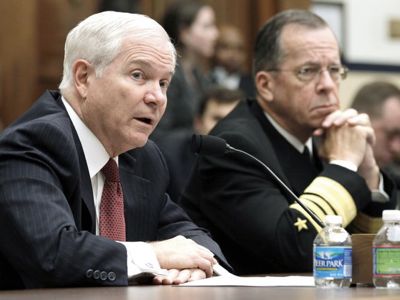
Thank you Mr. Chairman, and thank you for the opportunity to speak to the ongoing international military operations in Libya.
I would start by providing some context on how we got to this point, at least from my perspective. In the space of about two months, the world has watched an extraordinary story unfold in the Middle East. The turbulence being experienced by virtually every country in the region presents both perils and promise for the United States, as stability and progress in this part of the world is a vital national interest.
This administration’s approach has been guided by a core set of principles that President Obama articulated in February – opposing violence, standing for universal values, and speaking out on the need for political change and reform. At the same time, we have recognized that each country in the region faces a unique set of circumstances, and that many of the countries affected are critical security partners in the face of common challenges like Al Qaeda and Iran.
In the case of Libya, our government, our allies, and our partners in the region, watched with alarm as the regime of Moammar Qadhafi responded to legitimate protests with brutal suppression and a military campaign against his own people. With Colonel Qadhafi’s forces on the verge of taking Benghazi, we faced the very real prospect of significant civilian casualties and hundreds of thousands of refugees fleeing to Egypt, potentially destabilizing that important country even as it is undergoing its own difficult transition.
Once the Arab League and Gulf Cooperation Council called on Qadhafi to cease his attacks, and our European allies expressed a willingness to commit real military resources, it became apparent that the time and conditions were right for international military action.
The goal of Operation Odyssey Dawn – launched on March 19 – was limited in scope and scale. The coalition quickly achieved its first military objective by effectively grounding Colonel Qadhafi’s air force and neutralizing his air defenses. During this first phase, the U.S. military provided the preponderance of military assets and firepower as well as logistical support and overall command and control.
Responsibility for leading and conducting this mission – now called Operation Unified Protector – has shifted to an integrated NATO command. Going forward, the U.S. military will provide the capabilities that others cannot provide either in kind or in scale – such as electronic attack, aerial refueling, lift, search and rescue, and intelligence, surveillance and reconnaissance support. Accordingly, we will, in coming days, significantly ramp down our commitment of other military capabilities and resources in this operation.
The NATO-led mission, like its predecessor, is a limited one. It will maintain pressure on Qadhafi’s remaining forces to prevent attacks on civilians, enforce the no-fly zone and arms embargo, and provide humanitarian relief. There will be no American boots on the ground in Libya. Deposing the Qhadafi regime, as welcome as that eventuality would be, is not part of the military mission. In my view, the removal of Colonel Qadhafi will likely be achieved over time through political and economic measures and by his own people. However, this NATO-led operation can degrade Qadhafi’s military capacity to the point where he – and those around him – will be forced into a very different set of choices and behaviors in the future.
In closing, as I have said many times before, the security and prosperity of the United States is linked to the security and prosperity of the broader Middle East. I believe it was in America’s national interests – as part of a multilateral coalition with broad international support – to prevent a humanitarian crisis in Eastern Libya that could have destabilized the entire region at a delicate time. And, it continues to be in our national interest to prevent Qadhafi from visiting further depredations on his own people, destabilizing his neighbors, and setting back the progress the people of the Middle East have made in recent weeks.
Mr. Chairman, I know you and your colleagues have many questions, so I will now ask Admiral Mullen to comment. As always, my thanks to this committee for all the support you have provided to our military over the years.

 Articles by this author
Articles by this author











Stay In Touch
Follow us on social networks
Subscribe to weekly newsletter